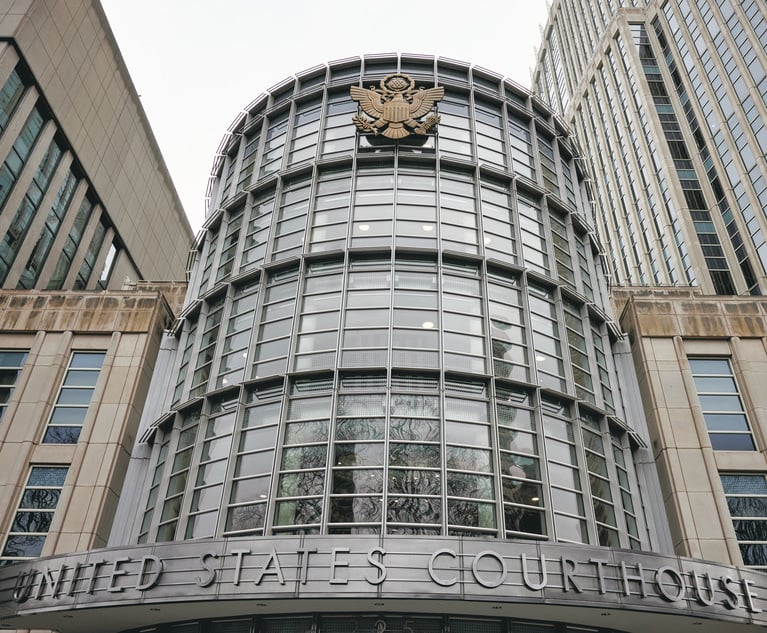A Call for New Legal Standards of Educational Neglect, Especially Regarding Special Needs
In their Family Law column, Kathryn Krase and Daniel Pollack discuss the impact of school closures due to COVID-19 on families with school-aged children who have special needs.
July 10, 2020 at 12:15 PM
6 minute read
 Kathryn Krase and Daniel Pollack.
Kathryn Krase and Daniel Pollack.
Parents and guardians of school-age children are struggling with some daunting realities in this current crisis. With parts of the country still under months-long stay-at-home orders, and schools closed by law for the foreseeable future, parents are expected to keep their household physically safe from COVID-19 and their children emotionally protected from stress and anxiety, while simultaneously managing harsh fiscal realities, all the while being responsible for supporting their school-aged children's education. While concern for parents is universal, the complicated position of an important subset of this population is often overlooked: parents of children with special needs.
Many parents of typically developing children are currently fearful that their children, missing the educational opportunities that in-person schooling provided them, will fall behind academically. Parents of children with special needs have the added worry that their children won't just fall behind academically, but are missing the high level of support necessary to ensure continuous development of their social/emotional, fine/gross motor skills, speech skills, etc.
Nearly 15% of all public school students, ages 3-21, receive special education services. This means that while all children are attempting remote learning in their homes through the support of their parents, over 7 million children are likely missing out on at least some part of the direct services prescribed for them through Individualized Education Plans (IEPs) provided for by federal law, i.e., the Individuals with Disabilities Education Act (IDEA).
Which special education services are provided vary greatly by student, and in accordance with their needs, as prescribed in their IEP after evaluation by education and related service professionals. Such services could include: accommodations for educational support in a general education classroom, educational support services provided outside the classroom, placement in a classroom specifically designed to meet the needs of children with special needs, and/or related services (i.e., speech/language therapy, counseling services, physical therapy, occupational therapy, assistive technology, etc.).
At best, children who normally receive special education services through their schools are currently missing opportunities specifically designed to support their development. At worst, many children will regress in the progress they have made in schools, due to a lack of access to vital educational and related services during this crisis. Who, if anyone, should be held responsible for these losses?
There are over 13,000 different school districts across the United States, with likely 13,000 different plans on how to serve children with special needs under their care, and with different degrees of expertise and different levels of resources. Early in this crisis, a confusing directive from the United States Department of Education (USDOE) seemed to suggest that school districts could (and even should) avoid serving the needs of students with disabilities by not providing educational services to all children in their districts. Astoundingly, some school districts seemed to consider a plan to deny all children access to educational services as a viable option.
The USDOE clarified its directive in a subsequent memo that highlighted the importance of providing educational opportunities for all children during this crisis, and encouraged "parents, educators, and administrators to collaborate creatively to continue to meet the needs of students with disabilities." Many school districts, including the nation's largest, New York City's Department of Education, have created new systems (e.g.. NYCDOE Special Education Remote Learning Plan) to document how schools will meet the needs of children with special needs while they are learning at home.
While the federal government has made it clear that schools must continue to do what they can to meet the educational needs of children with special needs, it is unclear what the law expects from parents of children with special needs in the current crisis. Every parent is responsible, by law, for ensuring that their child receives an education. Of course, children are shortchanged simply by falling behind in their education, but it is the parents who may bear the legal brunt of a child being in violation of state educational neglect laws.
Educational neglect is generally defined as the failure of a parent or guardian to:
- enroll a child of mandatory school age in school,
- to provide suitable homeschooling, or
- support necessary special educational instruction and services.
The last category in this definition of educational neglect is the most relevant to the current discussion. How can, and should, the system hold parents responsible for supporting the instruction and services prescribed to children with special needs in the current crisis?
Parents of a child with special education needs have many questions:
- Are my child's special needs being adequately addressed through remote learning?
- Are evaluations of students to determine their need for services being conducted during this crisis?
- How are required meetings regarding Individualized Education Plans (IEPs) and "504 Plans" being held?
- My child usually attends school through the summer: How are Extended School Year (ESY) services affected?
- How can I support and supplement remote special education services so that my child's education and development is maximized?
While every one of the aforementioned questions is important, the answer to the final one is the most elusive because policies concerning parents' responsibilities to their child's education are already highly subtle. These responsibilities have become more complex, and less clear, with the advent of COVID-19. Balancing the right of parents to provide for the education of their children free from government limitation with the state's obligation to ensure that each child receives a meaningful education has never been more nuanced. State level educational neglect statutes already give considerable discretion as to how school districts apply these policies to parents of students with special education needs. The current crisis only exacerbates the opaqueness.
Ironically, the present COVID-19 crisis may give parents, legislators, and school officials a unique opportunity to modify and codify best practices to prevent and respond to allegations of educational neglect of special needs children.
We are at a critical juncture in society where systems have the opportunity to review and revise to better meet the needs of those they serve. We cannot rely upon the systems already in place to appropriately respond to the unique realities we face today.
Kathryn Krase and Daniel Pollack are both attorneys and professors at the Wurzweiler School of Social Work at Yeshiva University in New York City. Dr. Krase is co-author of Mandated Reporting of Child Abuse and Neglect: A Practical Guide for Social Workers. Professor Pollack is co-author of Social Work and the Courts. Contact: [email protected]; [email protected].
This content has been archived. It is available through our partners, LexisNexis® and Bloomberg Law.
To view this content, please continue to their sites.
Not a Lexis Subscriber?
Subscribe Now
Not a Bloomberg Law Subscriber?
Subscribe Now
NOT FOR REPRINT
© 2025 ALM Global, LLC, All Rights Reserved. Request academic re-use from www.copyright.com. All other uses, submit a request to [email protected]. For more information visit Asset & Logo Licensing.
You Might Like
View All
The Met Hires GC of Elite University as Next Legal Chief

NY Appellate Panel Cites Student's Disciplinary History While Sending Negligence Claim Against School District to Trial

'No Evidence'?: Big Law Firms Defend Academic Publishers in EDNY Antitrust Case
3 minute read
'Substantive Deficiencies': Judge Grants Big Law Motion Dismissing Ivy League Price-Fixing Claims
3 minute readTrending Stories
- 1Law Firms Expand Scope of Immigration Expertise, Amid Blitz of Trump Orders
- 2Latest Boutique Combination in Florida Continues Am Law 200 Merger Activity
- 3Sarno da Costa D’Aniello Maceri LLC Announces Addition of New Office in Eatontown, NJ, and Named Partner
- 4Friday Newspaper
- 5Public Notices/Calendars
Who Got The Work
J. Brugh Lower of Gibbons has entered an appearance for industrial equipment supplier Devco Corporation in a pending trademark infringement lawsuit. The suit, accusing the defendant of selling knock-off Graco products, was filed Dec. 18 in New Jersey District Court by Rivkin Radler on behalf of Graco Inc. and Graco Minnesota. The case, assigned to U.S. District Judge Zahid N. Quraishi, is 3:24-cv-11294, Graco Inc. et al v. Devco Corporation.
Who Got The Work
Rebecca Maller-Stein and Kent A. Yalowitz of Arnold & Porter Kaye Scholer have entered their appearances for Hanaco Venture Capital and its executives, Lior Prosor and David Frankel, in a pending securities lawsuit. The action, filed on Dec. 24 in New York Southern District Court by Zell, Aron & Co. on behalf of Goldeneye Advisors, accuses the defendants of negligently and fraudulently managing the plaintiff's $1 million investment. The case, assigned to U.S. District Judge Vernon S. Broderick, is 1:24-cv-09918, Goldeneye Advisors, LLC v. Hanaco Venture Capital, Ltd. et al.
Who Got The Work
Attorneys from A&O Shearman has stepped in as defense counsel for Toronto-Dominion Bank and other defendants in a pending securities class action. The suit, filed Dec. 11 in New York Southern District Court by Bleichmar Fonti & Auld, accuses the defendants of concealing the bank's 'pervasive' deficiencies in regards to its compliance with the Bank Secrecy Act and the quality of its anti-money laundering controls. The case, assigned to U.S. District Judge Arun Subramanian, is 1:24-cv-09445, Gonzalez v. The Toronto-Dominion Bank et al.
Who Got The Work
Crown Castle International, a Pennsylvania company providing shared communications infrastructure, has turned to Luke D. Wolf of Gordon Rees Scully Mansukhani to fend off a pending breach-of-contract lawsuit. The court action, filed Nov. 25 in Michigan Eastern District Court by Hooper Hathaway PC on behalf of The Town Residences LLC, accuses Crown Castle of failing to transfer approximately $30,000 in utility payments from T-Mobile in breach of a roof-top lease and assignment agreement. The case, assigned to U.S. District Judge Susan K. Declercq, is 2:24-cv-13131, The Town Residences LLC v. T-Mobile US, Inc. et al.
Who Got The Work
Wilfred P. Coronato and Daniel M. Schwartz of McCarter & English have stepped in as defense counsel to Electrolux Home Products Inc. in a pending product liability lawsuit. The court action, filed Nov. 26 in New York Eastern District Court by Poulos Lopiccolo PC and Nagel Rice LLP on behalf of David Stern, alleges that the defendant's refrigerators’ drawers and shelving repeatedly break and fall apart within months after purchase. The case, assigned to U.S. District Judge Joan M. Azrack, is 2:24-cv-08204, Stern v. Electrolux Home Products, Inc.
Featured Firms
Law Offices of Gary Martin Hays & Associates, P.C.
(470) 294-1674
Law Offices of Mark E. Salomone
(857) 444-6468
Smith & Hassler
(713) 739-1250






